Neighbors from the south do not associate contemporary Poles with invasions and war. But our ancestors saw it differently 1,000 years ago. It was the Czechs who dealt the final blow, sealing the collapse of the young Polish state. The invasion of prince Brzetysław in 1038 was a real hecatomb. The Czechs captured thousands of people, set fire to the most important castles and buildings, stole as much as they could, without hesitating to profane the graves of Polish rulers. They also removed the most valuable relics from the Piast state, including the body of St. Wojciech.
It should be noted, however, that the Czech prince only took advantage of the situation. He had a chance to win, easy loot, adding splendor to himself and his country. The country of Polan was as weak as ever, depopulated, engulfed in anarchy, after exhausting wars with invaders from the east and west. And several dozen years earlier, all the neighbors trembled at the Piasts . During more than 25 years of reign, Bolesław the Brave more than once interfered in the affairs of his neighbors:he intervened in the Czech Republic (he was even supposed to take the throne for a short time in Prague) and in Kiev in Ruthenia, he competed with powerful Germany for Meissen, Milsko and Lusatia. The latter joined Poland, as did Grody Czerwienskie in the east, Slovakia and Moravia.
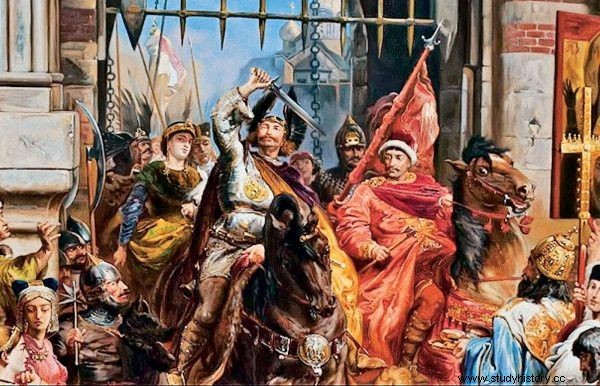
Bolesław the Brave left behind a mighty country
Bolesław, who before his death as the first ruler of Poland, managed to put on the crown, left behind a mighty country . Today there is no lack of opinion that Chrobry had ambitions much greater than just the crown. He wanted to become the emperor of Sclavonia, that is, the Slavic region. The fact is that in his time the Piast state was the most powerful in this part of Europe. Unfortunately, the power did not last long. The successor of Bolesław, his son, Mieszko II, did not manage to maintain her.
Anatomy of a fall
Historians are divided on the opinion of Mieszko. Was he inept, or maybe the circumstances objectively turned out to be too difficult, or was it the fault of his father who created a colossus on earthen legs? Today it is the subject of polemics and many analyzes. It is certain that Mieszko was distinguished from his predecessors by education . He was much better at "salons" than his probably illiterate father. Thanks to the German princess Matilda, who corresponded with him and gave him a beautifully illustrated Codex with a dedication, we know that Mieszko knew Latin and Greek.
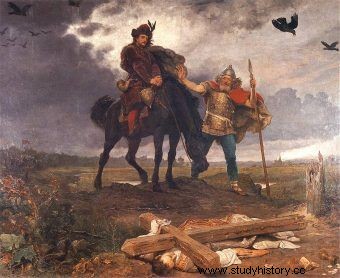
Casimir I the Restorer returned to the destroyed country ...
In 1025 he was crowned immediately and began his reign like his father - with a bang. He engaged in games against the German emperor Conrad II. He even promised to support the anti-imperial opposition, and he did so. Mieszko's invasion of Saxony was devastating, so much so that, according to chroniclers, after the passing of Mieszko's warriors even the grass did not want to grow . From the west, the young ruler brought all sorts of valuables and slaves. However, those were a good bad start.
It was not only the German emperor who stood against Mieszko, but also the two other sons of Brave, who were removed from the throne and probably expelled from the country, namely Bezprym and Otto. They both looked for allies at foreign courts. Otto probably visited Germany, with his sister - Margrave of Meissen Regelinda. In turn, Bezprym lobbied for the expedition against Mieszko in Rus. The efforts of both brothers paid off. In 1031 the invasion of the emperor Conrad II from the west and Prince Jarosław the Wise from the east was the first chord of the fall of the state . A dozen or so years earlier, before the peace was concluded in Budziszyn, Mieszko's father was able to fight effectively on two fronts. He failed it himself.
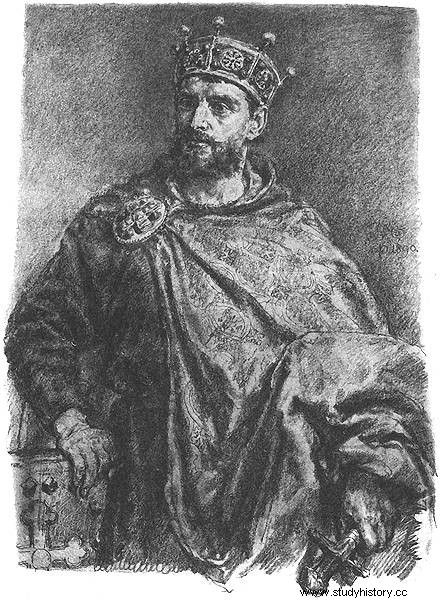
Mieszko II
Mieszko did not manage to cope with the invasion of his neighbors, especially since the Varangians fought in the Ruthenian ranks, led by Harald III the Fierce, the future king of Norway, sometimes called the "Northern Lightning" or "the last Viking". The son of the great Brave lost all the lands conquered by his father, escaped from the country to the Czech Republic, and the power was allegedly taken over by the extremely cruel Bezprym. He immediately sent back the Polish coronation insignia to the German emperor. At the same time, a terrible fate befell Mieszko. Instead of taking refuge in Bohemia, he found captivity . He was imprisoned by the local prince Udalryk and probably castrated by crushing the testicles. In this way, the neighbors were to "repay" the guilt of Brave. As Gall Anonymous wrote:
They also tell that the Czechs captured [him] treacherously at a rally and bound his genitals with thongs so that he could no longer beget [offspring], for the fact that King Bolesław, his father, had done a similar harm to them, having blinded their prince, and his uncle. Therefore Mieszko returned from captivity, but he did not know his wife again.
Castrating with eggs?
In spite of such a terrible trauma, Mieszko turned out to be a relentless tough guy . He managed to return from captivity and regain power in the country. By this time, the usurper Bezprym was dead. He was probably murdered as a result of a palace intrigue. According to chroniclers, Bezprym ruled extremely harshly and he was killed by "his own".
Mieszko II did not manage to stop the collapse of the state. After returning from captivity, he had to humble himself to the emperor. He resigned from appearing with any symbols of royal power. The state was divided between him and Brother Otto. They both died shortly after, and anarchy prevailed in the country . Mazovia, which was ruled by Mieszko's cup-bearer, Miecław, broke away from the Piast state. Mieszko's young son - Kazimierz - who tried to take control of the situation in Poland, had to flee with his mother Rycheza to Germany. In addition to the resistance of the nobles, a revolt of ordinary peasants broke out in the country, those who did not like the Piast order, exploitation, constant wars and new faith - in Jesus Christ ...
(...) slaves rose up to be lords, freedmen against the noble ones, elevated themselves to the government, and kept some in captivity, they killed others, and their wives were married to each other in a lewd way and criminally torn the dignity (...) . Moreover, abandoning the Catholic faith - which we cannot utter without crying and lamenting "- they raised a rebellion against the bishops and priests of God (...) Gall Anonymous recalled.
Corrupted Politics
And it was in such circumstances that the Czechs moved against the Poles. Prince Brzetysław realized that the Piast country was strongly weakened. So the game was worth the candle and it wasn't just about valuables. The Poles had something much more valuable - the body of St. Adalbert, murdered by the pagan Prussians during an attempt to convert them. The body of the martyr was bought as a valuable relic by Bolesław the Brave - for as much gold as it weighed and deposited in the Gniezno cathedral. Why do the Czechs need Wojciech's corpse? They could greatly help them politically. The holy relic was an important argument in the efforts to obtain the archbishopric, and such would allow the Czech church hierarchy to become independent of the Germans. Poland succeeded in this in 1000 (the archbishopric in Gniezno and the bishoprics in Kraków, Kołobrzeg and Wrocław).
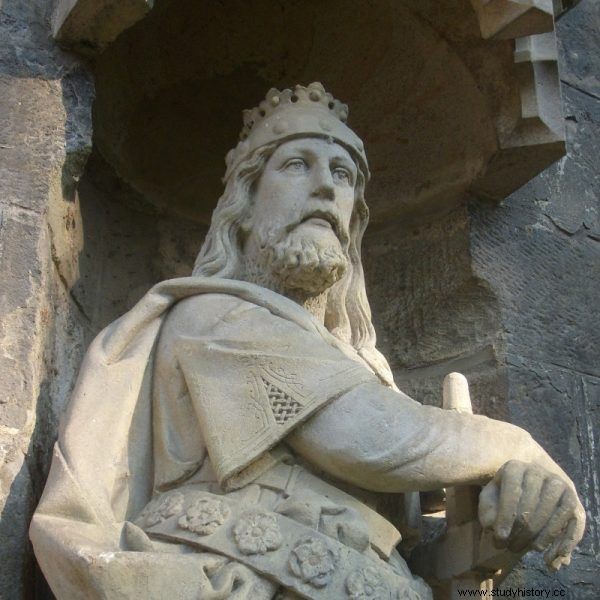
Brzetysław I
Of course, the matter could also be given an appropriate propaganda dimension. In the end, Wojciech - from Czech origin after all - "returned to the motherland", and all thanks to Brzetysław . So that Wojciech's move was "dignified", the prince even took the Prague bishop of Prague with him on the expedition. However, this one would be wrong, I would think that the Czechs would be satisfied only with the corpse. The Poles did not lack riches and slaves that could be stolen.
Czech Apocalypse
Brzetysław amassed a powerful army of warriors. Apparently, anyone who did not turn up would be threatened with a noose. However, there was no reason to make threats. After crossing the border, the Czech warriors did not encounter the Piast princely team, famous for their bravery. It just wasn't there.
The country of the Piasts, exhausted by wars and conflicts, offered almost no resistance to the invaders. The wiser peasants realized that the relief would not come and they voluntarily surrendered themselves. This is what inhabitants of Giecz. Brzetysław easily marched deep into Poland with his troops. The destination of his journey was far from the Czech border, because only in Gniezno.
According to chroniclers, the Czechs - who still remembered the Polish domination in the times of Brave - destroyed, murdered and burned whatever fell . Perhaps their goal was to completely destroy the country in the north that until recently dominated them.
Just as an immense storm rages, rages, everything collapses, so Brzetysław devastated villages with slaughter, robberies, fires, and conquered defensive places by force. He burned cities with fire until he destroyed them to the ground
- wrote Kosmas.
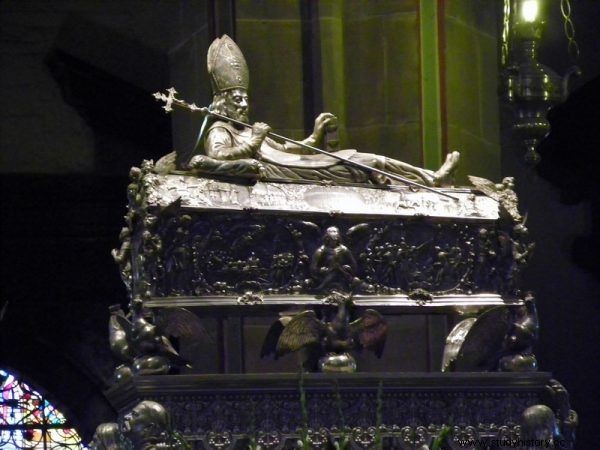
Brzetysław took the body of St. Wojciech
This is how the Czech rally went through the Piast country. Czech warriors demolished castles and temples. They destroyed all the civilization achievements of the young state. The cathedral in Poznań, where the graves of Mieszko I and Bolesław the Brave were plundered, went up in smoke . The city of Poznań also went up in smoke. The same thing happened with the cathedral in Gniezno, which Brzetysław took over without any problem. The Czechs demolished the altar and stole the body of St. Wojciech. Years later - so that it would not be considered a shameful sacrilege - the chronicler Cosmas came up with a narrative appropriate for this, what we would call it today ...
Well, according to this chronicler, the removal of the body took place with the consent of ... Wojciech himself! First, when the Czech warriors - oblivious to Severus' warnings - rushed to demolish the altar in the Gniezno cathedral in order to get to the saint's tomb - he punished them with temporary blindness. Only when they made three-day fasts and realized their mistake did they regain their sight, and St. Wojciech allowed himself to be taken.
Interestingly - he is fawning on the holy body of Wojciech, the Czechs stole other relics - Five Martyrs (the corpses of those murdered in the Benedictine attack), and the body of a half-brother of St. Wojciech, the first archbishop of the capital of Gniezno - Radzim-Gaudenty.
Piastowskie El Dorado
However, Brzetysław also remembered to provide his warriors with the right amount of gold, which, according to chroniclers, was not lacking in the Piast country. The invaders deported from Gniezno, among others a golden cross funded by Mieszko I, who was to weigh three times as much as himself .
According to Kosmas, the Czechs came back literally laden with valuables. They did not hesitate to rip them off the holy places. The hundred carts that the Czechs were pulling from Poland were full of treasures from the temples . Among them were powerful church bells and
three heavy plates of gold that were placed near the altar where the holy body rested. The largest plate, five cubits (about three meters) long and ten hands (about two meters) wide, was heavily decorated with precious stones and crystal ambers, and on the edge of which was this poem written? This work weighs as much as three hundred fines (over 15 kg) of gold.
Thousands of prisoners of war followed the wagons full of valuables . The country was also stripped of cattle, grain, skins - everything of any value. The scale of the state's collapse can be proved by the laconic, yet profoundly meaningful statement by Gall-Anonymus, who admitted in the pages of his chronicle that
the aforementioned cities remained abandoned for so long that in the church of St. Wojciech Męczennik and St. Peter the Apostle, wild animals found their lair.
Returning to their lands, the Czechs separated Silesia from the Piast state.
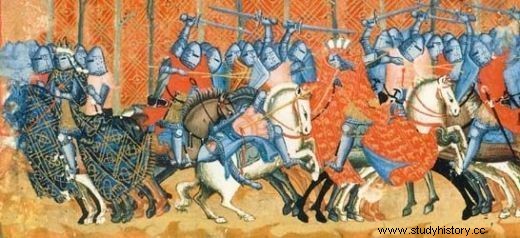
Battle of Brzetysław's army with the German invasion in 1040
A new start
The corpse of St. Wojciech Brzetysław, with great respect, deposited in the Prague cathedral of St. Greets. After he left Poland, the Piast country was almost non-existent. It was the Czech Republic that rose to the rank of local hegemon, but this turn of events was not to the taste of the German emperor . Therefore, it finally allowed for the licensed reconstruction of Poland. The son of Mieszko II - Kazimierz - returned to Poland. Thanks to the emperor's help, he regained power in Greater Poland and strengthened the weakened Christianity. With time, he also managed to re-join Masovia, and later even Silesia. However, he had to pay tribute to the Czechs for this. The prince's main seat was moved to Krakow. The state slowly managed to get back on its feet. However, there was no question of the former greatness from the times of Brave.
